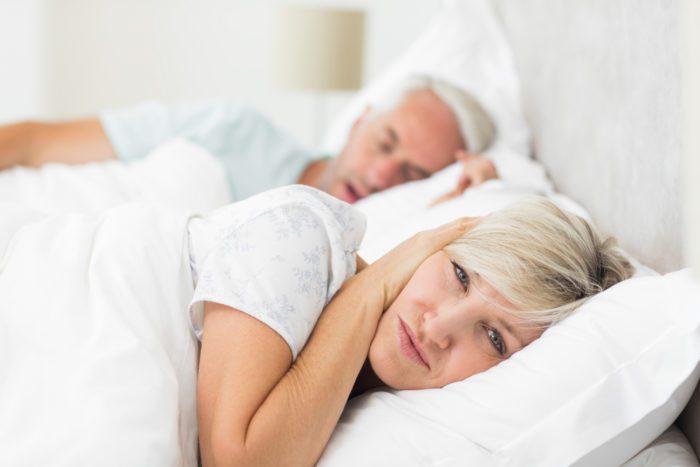Have you been told that you snore? Do you wake feeling tired and not rested? Perhaps you have trouble concentrating throughout the day? If so, you may have a serious sleeping disorder known as sleep apnea. However, not all snoring is related to sleep apnea, but it is one of the main symptoms. If you are concerned, you should talk to your dentist about a sleep study. Then, they may be able to help minimize your symptoms.

What Is Sleep Apnea?
Sleep apnea is a dangerous sleep condition in which you stop breathing several times throughout the night. The most common form of sleep apnea is obstructive sleep apnea (OSA). As you sleep, your body should relax fully. However, the soft tissues in your throat relax too much, making it difficult to breathe. Your soft palate and tongue block your airway, minimizing your oxygen levels. When you stop breathing, your blood oxygen levels lower, causing your body to force you awake. This process can happen hundreds of times a night.
When your body struggles to breathe, it panics and elicits a stress response. Your body will release the fight-or-flight hormones—adrenaline and cortisol. Normally, your body releases these hormones as a defense. They help you to move faster and think quicker. However, when you can’t breathe, your body sees this as a threat. If your body is exposed to adrenaline and cortisol for long periods, it can damage your immune system. Unfortunately, this means that you are more susceptible to getting sick, and you will have a hard time fighting off infections.
People who have sleep apnea are more likely to develop chronic conditions, such as heart disease. Because your body undergoes excess stress from waking in a panic, your heart receives damage over time.
How Can Your Dentist Help?
The typical treatment for sleep apnea is a CPAP machine. This is a device that delivers a constant stream of oxygen while you sleep. Not only does this keep your blood oxygen at a safe level, but it also keeps your airway open. However, some patients don’t like the bulkiness of a CPAP machine. Also, they may find it difficult to travel with ease.
For mild to moderate cases of OSA, your dentist can offer oral appliance therapy (OAT). OAT is a custom-made device that fits in your mouth while you sleep. Rather than the soft tissues blocking your airway, the oral appliance prevents airway obstruction. Additionally, an oral appliance keeps your jaw in alignment, which can also contribute to airway obstruction.
One of the benefits of OAT is that it doesn’t require any electricity for it to work. This makes it easier to travel. Without electricity, there is no noise from your oral appliance. In addition, oral appliances fit in your mouth, which eliminates the bulky CPAP machine. If you move a lot in your sleep, you may find that a CPAP machine inhibits your ability to switch positions. However, an oral appliance device fits comfortably in your mouth, allowing you to move with ease.
